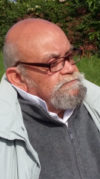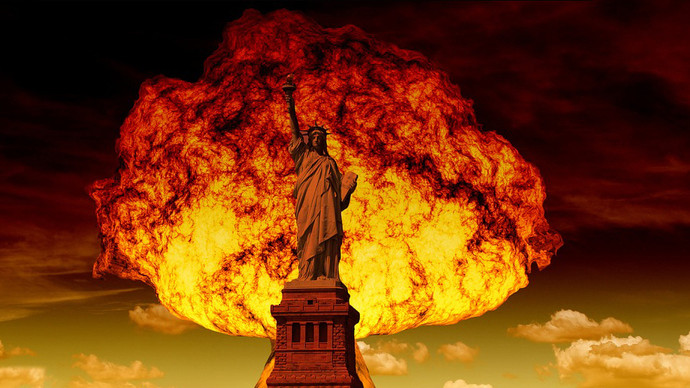No Health But Bombs!
TRANSCEND MEMBERS, 19 Mar 2018
Baher Kamal – Wall Street International Magazine
1 in 2 Humans Lack Basic Healthcare, while Politicians…
14 Mar 2018 – Apologies once more for further annoying you with real facts of life, this time to explain that at least 1 in 2 of our “Planet-mates” human beings do not know what basic health services are all about.
And the fact is that, while politicians in the richest countries appear to be heavily engaged in forcing their tax-payers to forget about public health and pensions funds and to instead shift to the private sector to try to obtain these basic services they have already paid for, more than half of all humans are lacking access to such an essential right.
But before explaining what is going on, you may wish to know that several major private banks and healthcare and pension funds corporations have been using your money to “invest” in the production of nuclear bombs. Just go through this short report until the end!
For now, let’s start with some more facts and figures as provided by the UN World Health Organization (WHO):
- Almost 100 million people are being pushed into extreme poverty, forced to survive on just 1.90 dollars or less a day, because they have to pay for health services out of their own pockets.
• Over 800 million people (almost 12 per cent of the world’s population) spend at least 10 per cent of their household budgets on health expenses for themselves, a sick child or other family member. They incur so-called “catastrophic expenditures”.
• Incurring catastrophic expenses for health care is a global problem. In richer countries in Europe, Latin America and parts of Asia, which have achieved high levels of access to health services, increasing numbers of people are spending at least 10 per cent of their household budgets on out-of-pocket health expenses.
These facts, among many others, will be “newsable” at least for one day: the World Health Day 2018: Health for All marked on 7 April each year.
What It Is?
This year’s theme is “Universal Health Coverage – Everyone, Everywhere.” Fine. But what does UHC or universal health coverage mean? According to the world’s top health body, it consist of seven basic requirements:
- Universal health coverage is about ensuring all people can get quality health services, where and when they need them, without suffering financial hardship.
- No one should have to choose between good health and other life necessities.
- UHC is key to people’s and nations’ health and well-being.
- UHC is feasible. Some countries have made great progress. Their challenge is to maintain coverage to meet people’s expectations.
- All countries will approach UHC in different ways: there is no one size fits all. But every country can do something to advance UHC.
- Making health services truly universal requires a shift from designing health systems around diseases and institutions towards health services designed around and for people.
- Everyone can play a part in the path to UHC, by taking part in a UHC conversation.
In other words, “Universal” in UHC means “for all,” without discrimination, leaving no one behind. Everyone everywhere has a right to benefit from health services they need without falling into poverty when using them.
Should this not be clear enough, WHO further explains that UHC means that all people and communities receive the health services they need without suffering financial hardship.
And that UHC enables everyone to access the services that address the most important causes of disease and death and ensures that the quality of those services is good enough to improve the health of the people who receive them.
And What It Is Not?
Once defined what universal health coverage is all about, WHO now tells what it is not:
- UHC does not mean free coverage for all possible health interventions, regardless of the cost, as no country can provide all services free of charge on a sustainable basis.
- UHC is not only about ensuring a minimum package of health services, but also about ensuring a progressive expansion of coverage of health services and financial protection as more resources become available.
- UHC is not only about medical treatment for individuals, but also includes services for whole populations such as public health campaigns – for example adding fluoride to water or controlling the breeding grounds of mosquitoes that carry viruses that can cause disease.
- UHC is not just about health care and financing the health system of a country. It encompasses all components of the health system: systems and healthcare providers that deliver health services to people, health facilities and communications networks, health technologies, information systems, quality assurance mechanisms and governance and legislation.
Who Funds Nuclear Weapons?
Here you are another striking fact–the 2017 Peace Nobel Laureate—the International Campaign to Abolish Nuclear Weapons (ICAN), along with other civil society organisations, has been relentlessly alerting against what several private banks and pension funds have done with your money: financing the production of nukes, the most devastating weapons of mass destruction. See this year’s Don’t Bank on the Bomb campaign!.
________________________________________________
 Baher Kamal, a member of the TRANSCEND Network for Peace Development Environment, is an Egyptian-born, Spanish national, secular journalist, with over 45 years of professional experience — from reporter to special envoy to chief editor of national dailies and an international news agency. Baher is former Senior Advisor to the Director General of the international news agency IPS (Inter Press Service) and he also contributed to prestigious magazines such as TRANSCEND Media Service, GEO, Muy Interesante, and Natura, Spain. He is also publisher and editor of Human Wrongs Watch.
Baher Kamal, a member of the TRANSCEND Network for Peace Development Environment, is an Egyptian-born, Spanish national, secular journalist, with over 45 years of professional experience — from reporter to special envoy to chief editor of national dailies and an international news agency. Baher is former Senior Advisor to the Director General of the international news agency IPS (Inter Press Service) and he also contributed to prestigious magazines such as TRANSCEND Media Service, GEO, Muy Interesante, and Natura, Spain. He is also publisher and editor of Human Wrongs Watch.
DISCLAIMER: The statements, views and opinions expressed in pieces republished here are solely those of the authors and do not necessarily represent those of TMS. In accordance with title 17 U.S.C. section 107, this material is distributed without profit to those who have expressed a prior interest in receiving the included information for research and educational purposes. TMS has no affiliation whatsoever with the originator of this article nor is TMS endorsed or sponsored by the originator. “GO TO ORIGINAL” links are provided as a convenience to our readers and allow for verification of authenticity. However, as originating pages are often updated by their originating host sites, the versions posted may not match the versions our readers view when clicking the “GO TO ORIGINAL” links. This site contains copyrighted material the use of which has not always been specifically authorized by the copyright owner. We are making such material available in our efforts to advance understanding of environmental, political, human rights, economic, democracy, scientific, and social justice issues, etc. We believe this constitutes a ‘fair use’ of any such copyrighted material as provided for in section 107 of the US Copyright Law. In accordance with Title 17 U.S.C. Section 107, the material on this site is distributed without profit to those who have expressed a prior interest in receiving the included information for research and educational purposes. For more information go to: http://www.law.cornell.edu/uscode/17/107.shtml. If you wish to use copyrighted material from this site for purposes of your own that go beyond ‘fair use’, you must obtain permission from the copyright owner.
